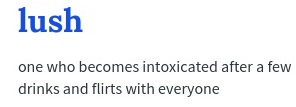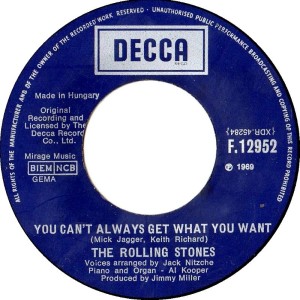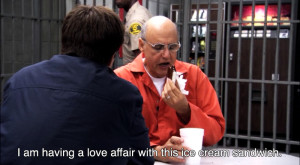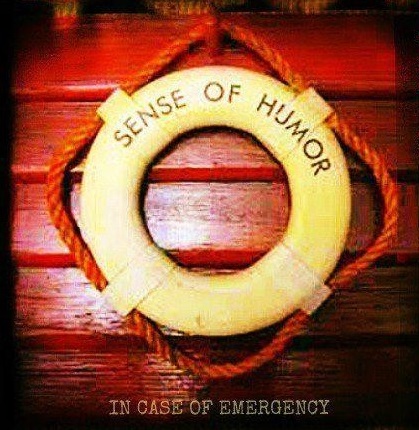“Sheep are very dim; once they get an idea in their heads, there’s no shiftin’ it.” — Monty Python’s Flying Circus, “Flying Sheep” skit.
My poor interlibrary loan clerk. This was the man who, one solar day before the humor-as-therapy program begins, comes to my office:
HE: “Sign me up for that thing you’re doin.’ Whaddaya call it? ‘Happy Time’?”
“‘Happy Time’? It’s ‘Skill-Building Techniques for Stress Reduction.’ How’d you get ‘Happy Time’ out of that?”
“I couldn’t remember all that. All I know is we’re supposed to laugh a lot.”
So I sign him up for ‘Happy Time,’ so he can laugh a lot.
A few weeks into our program, I ask this same ILL clerk if he’s completed his ‘Observing Your Personal Humor Style’ assignment for the week. This assignment asks inmates to be aware of countervailing humor types (constructive & destructive) while watching TV, listening to the radio, hearing funny comments or observing practical jokes in the Unit or the Yard, as well as funny things they say, do, or think. They are to keep a tally of each time they witness or participate in either constructive or destructive humor.
“I’m still doing it. I hear a lot of negative humor all around me is what I’m learning. There’s so much, I’ll have to use another page!”
“Just write in the space, ‘Too many to list.'”
“Oh! We can do that?”
“That’s what I’M doing. Especially with my thought life. Lots of destructive humor swirling around in there.”
“OK, good, thank you. That makes it a lot easier.”
“So, how’re you enjoying the course so far?”
“I like it! I like when you showed the cartoons. I laughed at almost every one of those.”
“Happy Time.”
“You’re not gonna let me forget that, thanks! I like that you can laugh and learn new stuff at the same time. Just don’t expect me to do Twister™. I was talkin’ with some of the guys. They’re gonna push back on that one.”
It is here that we must pause our narrative, and interject some much-needed-or-the-rest-of-this-won’t-stand-a-chance-of-making-the-slightest-bit-of-sense back story.
In the previous class I mention that, when we finally do a Laughter Yoga session, we’ll need to remove the tables & chairs to make space for laughter exercises. I also mention that, when I participated in a laughter yoga session at Walpole Pubic Library, at the end of it all we lay on mats and practice deep, relaxing breaths as a cool-down from all the belly laughter. But In this man’s twisted mind, upon hearing the word mats and then the word exercises his thoughts twist to Twister™.
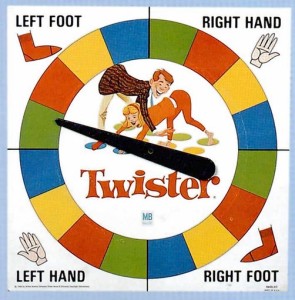 ME: “Twister™? What the hell are you talking about?”
ME: “Twister™? What the hell are you talking about?”
HE: “You said we had to play Twister™.”
“Never. Mother of God!”
“You told us last class.”
“Look, I created this program. Like I’m gonna have adult male prisoners playing Twister™ with each other.”
“Everyone else think so, too. They think you’re gonna make us play Twister™.”
“If they think that, it’s because of you!”
This past Friday, I mention to my course assistant that the ILL clerk refuses to understand that I never referred to, joked about, or even thought of Twister,™ “The Game That Ties You Up In Knots,” by Milton Bradley.
ME: “He’ll go to his grave believing that!”
ASSISTANT: “He’s a bug.” (Usage note: In New England, “He’s a bug” means “He is certifiably and dangerously insane”).
“He’s also the one who keeps advocating for us to screen The Wonderful Wizard of Oz. Hey, at least that has a twister in it.” <laughs> “THAT’S what he’s up to! He’s talking about twisters to make you show the film! Whadda they call that? Subliminal! He’s manipulating you!”
<laughs> “THAT’S what he’s up to! He’s talking about twisters to make you show the film! Whadda they call that? Subliminal! He’s manipulating you!”
Nah. He’s just a bug.
BTW — Here in New England, they call it ‘Twist-ah.’ Of course they do.
They also raise children, some of whom end up in jail believing that their  Librarian could even conceive of seeking written approval to supervise games of Twist-ah™ in an adult-male prison.
Librarian could even conceive of seeking written approval to supervise games of Twist-ah™ in an adult-male prison.
Humor-as-Therapy, indeed.


